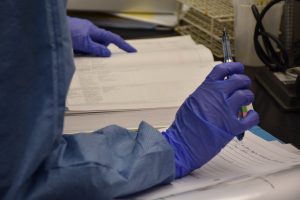Certification and Licensure
Certification
Certification is a voluntary process; however, most employers prefer to hire certified practitioners. After graduation, students are eligible to sit for exams to receive national certification from the ASCP Board of Certification (ASCP-BOC). We urge all graduates of our programs to seek certification, as it is an investment in your future in the profession. We recommend scheduling your exam soon after graduation (give yourself a little time to review!), while all that you have learned is fresh in your mind. Additional application information needed for certification examinations will be provided to students prior to completion of the program.
For CLS
After completion of a B.S. degree and the Clinical Laboratory Science curriculum, CLS students are eligible for certification as Medical Laboratory Scientists (MLS(ASCP)).
After acquiring additional experience and expertise, Medical Laboratory Scientists may seek advanced certification in their area of interest.
For MDS
Students who complete the Masters of Clinical Laboratory Science – Molecular Diagnostic Science track are eligible for certification as Molecular Biologists (MB(ASCP)).
For MLS
Students who hold ASCP certification at the technologist/scientist or specialist level are eligible for several other technologist/scientist certification exams through the ASCP Board of Certification, including the Molecular Biology exam (MB), via Route 1. (https://www.ascp.org/content/board-of-certification/get-credentialed) The courses in molecular diagnostic science are good preparation for the MB(ASCP) certification exam. The education practicum and/or electives taken, along with the student’s work experience, may serve as good preparation for other technologist/scientist or specialist examinations.
Licensure
Licensure is required for clinical laboratory personnel in certain states and territories. Each state/territory establishes its own requirements for obtaining a license to practice, and may update these requirements at any time. Currently, California, Florida, Georgia, Hawaii, Louisiana, Montana, Nevada, New York, North Dakota, Puerto Rico, and West Virginia require licensure. Other states, including North Carolina, do not.
Completion of the UNC BS in Clinical Laboratory Science or the UNC Master’s of Clinical Laboratory Science does not guarantee that a graduate will meet a state’s educational requirements for licensure. It has been determined that the CLS program at UNC does NOT meet the educational requirements for licensure in California or New York. The Division of CLS has not made a determination about whether completion of our program will meet the educational requirements for licensure in any other specific state or territory. Students who want to work in a state or territory that requires licensure should contact that jurisdiction’s licensing board as early as possible for information on the specific requirements. Basic requirements and contact information can be found on the ASCLS website: https://ascls.org/advocacy-issues/licensure.
